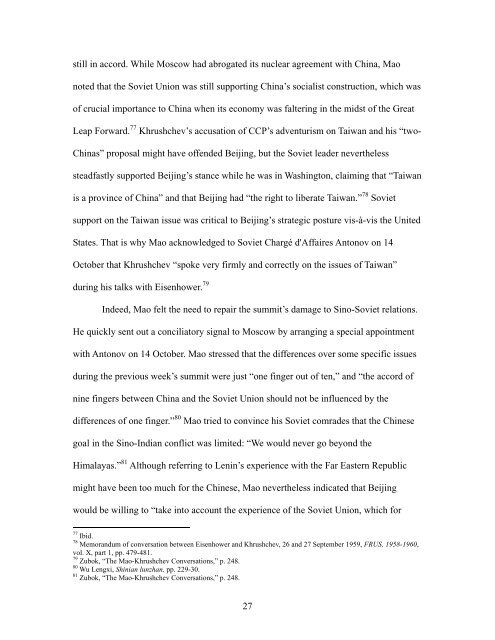The Quarrelling Brothers: New Chinese Archives and a ... - CiteSeerX
The Quarrelling Brothers: New Chinese Archives and a ... - CiteSeerX
The Quarrelling Brothers: New Chinese Archives and a ... - CiteSeerX
- No tags were found...
You also want an ePaper? Increase the reach of your titles
YUMPU automatically turns print PDFs into web optimized ePapers that Google loves.
still in accord. While Moscow had abrogated its nuclear agreement with China, Maonoted that the Soviet Union was still supporting China’s socialist construction, which wasof crucial importance to China when its economy was faltering in the midst of the GreatLeap Forward. 77 Khrushchev’s accusation of CCP’s adventurism on Taiwan <strong>and</strong> his “two-Chinas” proposal might have offended Beijing, but the Soviet leader neverthelesssteadfastly supported Beijing’s stance while he was in Washington, claiming that “Taiwanis a province of China” <strong>and</strong> that Beijing had “the right to liberate Taiwan.” 78 Sovietsupport on the Taiwan issue was critical to Beijing’s strategic posture vis-à-vis the UnitedStates. That is why Mao acknowledged to Soviet Chargé d'Affaires Antonov on 14October that Khrushchev “spoke very firmly <strong>and</strong> correctly on the issues of Taiwan”during his talks with Eisenhower. 79Indeed, Mao felt the need to repair the summit’s damage to Sino-Soviet relations.He quickly sent out a conciliatory signal to Moscow by arranging a special appointmentwith Antonov on 14 October. Mao stressed that the differences over some specific issuesduring the previous week’s summit were just “one finger out of ten,” <strong>and</strong> “the accord ofnine fingers between China <strong>and</strong> the Soviet Union should not be influenced by thedifferences of one finger.” 80 Mao tried to convince his Soviet comrades that the <strong>Chinese</strong>goal in the Sino-Indian conflict was limited: “We would never go beyond theHimalayas.” 81 Although referring to Lenin’s experience with the Far Eastern Republicmight have been too much for the <strong>Chinese</strong>, Mao nevertheless indicated that Beijingwould be willing to “take into account the experience of the Soviet Union, which for77 Ibid.78 Memor<strong>and</strong>um of conversation between Eisenhower <strong>and</strong> Khrushchev, 26 <strong>and</strong> 27 September 1959, FRUS, 1958-1960,vol. X, part 1, pp. 479-481.79 Zubok, “<strong>The</strong> Mao-Khrushchev Conversations,” p. 248.80 Wu Lengxi, Shinian lunzhan, pp. 229-30.81 Zubok, “<strong>The</strong> Mao-Khrushchev Conversations,” p. 248.27
















